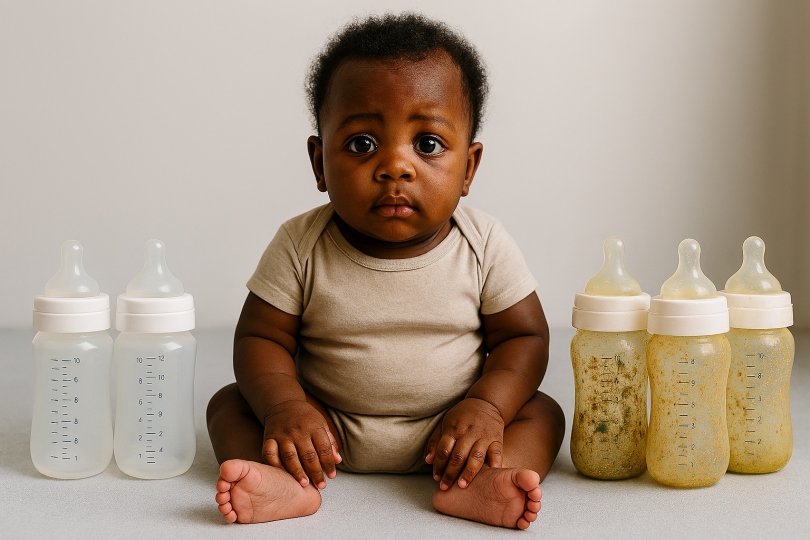Breast milk contains a remarkable array of nutrients that only nutrition experts can fully describe. This “liquid gold”, as I like to call it, provides complete nourishment and immune protection tailored to your baby’s needs.
However, safe storage, proper handling, and reliable sourcing of breast milk remain significant challenges for many mothers.
Globally, breast milk could save over 800,000 infants each year, potentially benefiting Black families greatly. Why? Because the mortality rates for Black infants are almost twice as high as those of white infants. The protective benefits of breast milk could be a critical factor in improving survival rates.
Unfortunately, some mothers can’t produce enough milk, while others are isolated from their babies. Many nursing mothers face challenges, such as limited storage space and the expense of pumping accessories, which disproportionately affect Black families due to systemic economic constraints.
Note that if anything goes wrong during storing, handling, and sourcing breast milk, it could be fatal for the baby. Therefore, caregivers must understand the safety measures and risks of sharing and storing breast milk. This is even more important for Black mothers, who often face more hurdles such as workplace barriers, inadequate housing conditions, and limited resources that make proper storage more difficult. Since Black babies already face higher health risks, getting milk storage right becomes even more critical.
Safe Storage of Breast Milk: What Every Parent Should Know
How you store breast milk can determine whether it nourishes your baby or exposes them to harmful bacteria.
Best Practices:
- Only use clean breast milk storage bags or Bisphenol A-free bottles
- As much as possible, refrigerate or freeze milk immediately after pumping
- Use different containers, labeling each with the date it was expressed
- Thaw the milk in the refrigerator or a bowl of warm water
- Don’t freeze thawed milk or microwave it, as this destroys the needed nutrients
Note: When breast milk is placed inside the fridge at 4°C or lower, it can last up to 4 days. In the freezer, it can last up to 6 to 12 months, depending on the brand you use.
Contamination Risks: When “Liquid Gold” Becomes a Danger and What to Do
Breast milk can become contaminated if it is not stored correctly or if hygiene practices are poor. When you give your babies contaminated milk, the effects can be fatal. According to Vinmec, potential risks include vomiting, diarrhea, stomach cramps, and, in some cases, death.
Diarrhea alone is estimated to cause 25% of deaths in children under 5 years. Here is a list of the major culprits:
- Unclean container
- Dirty hands
- Exposure to household chemicals or mold
- Exposure to smoke
Nursing mothers and other caregivers must be more intentional about hygiene. Elevate Black Health suggests the following:
- Wash containers with hot water, a dishwasher, or soapy water
- Sterilize a new or reused bottle before every use
- Wash your hands thoroughly before pumping, handling, and feeding the baby with the milk
- Store milk in a clean, dry space, far away from potential chemicals
- Avoid smoking or burning incense at all costs when pumping or storing breast milk, as smoke particles could settle
Toxins Transmitted from Mother to Baby Through Breast Milk
According to the National Health Service, a direct nutritional and chemical link exists between a breastfeeding mother and her baby. Some toxins can be passed from the breast milk of a mother to the child, which could pose a serious health risk. They are:
- Medications (Drugs)
- Alcohol
- Tobacco / Nicotine
- Viruses and bacteria (eg, HIV)
That is not to say nursing mothers shouldn’t take medication when treating ailments, but they must first consult with their doctors, especially if they are starting new medications.
Alcohol is another very toxic substance, which is why the Mayo Clinic strongly advises breastfeeding mothers to stay away from it, as it passes quickly into breast milk at an alarming rate. Notwithstanding, the USDA WIC Breastfeeding Support suggests that if a mother chooses to consume alcohol, it should be limited to a single drink at least 4 hours before breastfeeding. The baby should be at least 3 months old.
The Rise of Unscreened Milk: Should You Buy Breast Milk?
What is the fate of mothers who can’t produce enough breast milk for medical or personal reasons? To ensure their babies get the proper nutrition, some women buy breast milk from other nursing moms, primarily online or through an informal link-up, most of which are unscreened and from individuals they do not know.
We’re then faced with a significant issue: out of 6863 breast milk samples evaluated over seven years, only 18.3% have zero microbial growth. 17% failed the research criteria, and over 68% did not pass the safe bacteria count limit.
Problems with unscreened milk include:
- The donor may have a transmissible disease
- Milk may not be handled or stored properly
- Milk may be adulterated with cow milk or water
The US Food and Drug Administration strongly opposes sourcing breast milk from strangers or unscreened milk donors. Unfortunately, Black mothers who find it challenging to access formal healthcare systems tend to rely more on community support networks, according to a report by PubMed Central.
Are there safe alternatives? Sure.
- Milk banks: Donors are well-screened, and only pasteurized milk is distributed. Often times the cost is $3-5 per ounce and insurance may cover some cases
- Lactation consultants: They help improve milk supply or help you explore good formula options.
Individual safety practices are essential, yet to address breast milk safety in our communities, we must tackle systemic barriers such as workplace discrimination, environmental racism, and inadequate healthcare, all of which are responsible for making optimal infant feeding more challenging.
As a Black mother, you’re doing a noble job of ensuring that your baby is well nourished. Your effort is invaluable, but safety must come first, and it starts from the home. Elevate Black Health recommends only giving milk when you are sure your baby will not be in danger afterwards.
For further reading, visit:
- Starting Breastfeeding: Tips for New Mothers. https://www.elevateblackhealth.com/starting-breastfeeding-tips-for-new-mothers/
- Breast Milk Storage Questions and Answers. https://www.cdc.gov/breastfeeding/php/guidelines-recommendations/faqs.html
- Sharing breast milk is increasingly common, but its impact on infant nutrition is understudied. https://sph.unc.edu/sph-news/sharing-breastmilk-is-increasingly-common-but-its-impact-on-infant-nutrition-is-understudied/
- Knowledge, attitudes, and practice of breastmilk expression and storage among working mothers with infants under six months of age in Kenya. https://internationalbreastfeedingjournal.biomedcentral.com/articles/10.1186/s13006-022-00469-6
- Infant Health and Mortality and Black/African Americans. https://minorityhealth.hhs.gov/infant-health-and-mortality-and-blackafrican-americans
- Common Pumping Problems and Solutions. https://www.whattoexpect.com/first-year/breastfeeding/common-pumping-problems
- Overcoming Breastfeeding Limitations with Technology. https://www.elevateblackhealth.com/overcoming-breastfeeding-limitations-with-technology/
- Nutrition and healthy eating. https://www.mayoclinic.org/healthy-lifestyle/nutrition-and-healthy-eating/expert-answers/bpa/faq-20058331
- Signs to Identify Spoiled Breast Milk. https://www.vinmec.com/eng/blog/signs-of-spoiled-breast-milk-en
- Spoiled breast milk and bad water: local understandings of diarrhea causes and prevention in rural Sierra Leone. https://bmcpublichealth.biomedcentral.com/articles/10.1186/1471-2458-13-1172
- Food and drinks to avoid when breastfeeding. https://www.nhs.uk/start-for-life/baby/feeding-your-baby/breastfeeding/healthy-diet-when-breastfeeding/food-and-drinks-to-avoid-when-breastfeeding/
- Infant and toddler health. https://www.mayoclinic.org/healthy-lifestyle/infant-and-toddler-health/expert-answers/breast-feeding-and-alcohol/faq-20057985
- Breastfeeding and Alcohol, Drugs, and Smoking. https://wicbreastfeeding.fns.usda.gov/breastfeeding-and-alcohol-drugs-and-smoking
- 10 Myths Discouraging Black Breastfeeding. https://www.elevateblackhealth.com/10-myths-discouraging-black-breastfeeding/








